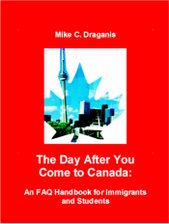Arriving in Canada
I arrived at the Toronto airport. Things were going pretty smooth there. However, my papers were examined again and I was issued a form showing my status (as a student) in Canada and the time limit for that. The whole process took some half an hour. After that I got my luggage and was out in the airport. So I was in Canada!
What to do next? I checked in advance on the Internet about the Toronto transit system and how to get to the railway station. So I knew it was a bus line running from the airport close to downtown and from there I had to take the subway to the railway station.
So I exchanged 10 USD into Canadian dollars in the airport to have money for the bus ticket and I went to the bus stop at the airport. There, surprise, I could not get into the bus! I tried as I saw other people to get in through the front door, by the driver. I saw people putting the money in a glass box close to the driver but I heard the driver saying "exact fare please!". Then I realized that I had to put in the box exactly 2.50 dollars (the price of the trip) and not more. The driver was unable to give change!
So I did not take that bus. I went back into the airport and went to a pop machine. I put a 10 dollar bill into the machine, bought a can of pop, and the machine gave me the change in coins. Now I had coins to I could match the $2.50 I needed for the bus ticket.
I went back to the bus stop and took the next bus. Now I knew what to do. After I put the money in the box, the driver asked "do you want a transfer?". I did not know what this meant. Then he showed me the bus ticket. Later I noticed that some people did not want the bus ticket because they did not need it: they were riding just that bus. But people wanting to take another bus or the subway within a certain time interval (some 90 minutes) needed such a "transfer" ticket to show when getting to the next bus. Otherwise they had to pay again the $2.50.
So I rode the bus about 45 minutes and then got off at a subway station. There I went into the station and showed the guy there my "transfer" before proceeding to the train. I took the subway train to the railway station.
